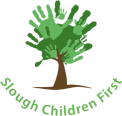Cippenham Nursery School


Cippenham Nursery school is a local authority maintained school that provides free term time education for 2-3 year old and 3-4 years old.
Who to contact
- Contact name
- Nisha Gill
- Contact position
- Headteacher
- Telephone
- 01628 661506 01628 661506
- head@cns.slough.sch.uk
- Website
- Cippenham Nursery School
- Scan to visit this website
Where to go
- Name
- Cippenham Nursery School
- Address
-
St Andrews Way
Cippenham
Slough
Berkshire - Postcode
-
SL1 5NL
Find SL1 5NL on a map
Availability
- Wheelchair access
- Yes
- Other notes
Please check our SEND local offer section.
Inclusion information
- Wheelchair access
- Yes
- Special Needs provision
- Yes
- Provision for special dietary needs
- Yes
- Special cultural provisions
- Yes
Childcare information
Vacancies
- Has immediate vacancies for funded early learning?
- Yes
- Details
- 10 spaces available for 2-3 year olds - 15hours pm session. Parents must be eligible and require a code.
- Updated
- 15/03/2024
Funded places
- 3/4 year old funding
- Yes
- 2 year old funding
- Yes
Opening times & facilities
- Facilities
-
Climbing frame
Refreshments
CCTV
Music & Movement
Sensory room
Cookery
Multicultural equipment
Sandpit
Messy play
Open space
Dressing up
Singing
Musical instruments
Storytime
Out-door Play
Education in Foundation Stage
Other
Games
Fruit
Teddies
Trampoline
Toys
Pet Small Mammals
Toilets/changing area
Garden apparatus
Garden
Baby facilities
House based activities
Baby corner
Home corner
Playhouse
Healthy eating
Arts & Crafts
Quiet room
Woodwork room
Library visits
Both indoor and outdoor activities
Books
Quiet area
Jigsaw, building blocks, tricycle, scooter, gardening, bubble machine
School pickups
Does not offer school pickups
Local Offer
- Contact name
- NIsha Gill
- Contact telephone
- 01628661506
- Contact email
- head@cns.slough.sch.uk
- Local Offer age bands
- Early Years (0-4 years)
Schools extended Local Offer response
- Special Educational Needs policy
Our mission statement is ‘Happy to be here’.
Our nursery is a state-maintained nursery school with up to 156 part-time places.
Following the introduction of the 30hr entitlement, approximately half of our places are allocated to 30hr children.
Some pupils attend for three hours each day during the morning or afternoon sessions, whilst others attend for 6 hrs each day.
We have three classes, each containing 26 children, with 2.5 teachers leading planning. There are two keyworkers per class and each keyworker is responsible for 13 children. We also have 3.5 teaching assistants, who work under the direction of the SENDco.
We aim to provide all children with a broad and balanced learning environment that is committed to the integration and inclusion of children with Special Needs. Our philosophy is that all children ‘with or without Special Needs’ should have the opportunity to develop to their full potential alongside other children in an educational environment.
Our nursery is fully accessible for wheelchair users and there are children’s and adult’s toilets for the physically disabled. We have a private room with a changing unit, and a seperate room where medical and first aid equipment can be safely stored.
- Teaching and learning
We follow the guiding principles of the Early Years Foundation stage which are as follows.
- A unique child – every child is a competent learner from birth who can be resilient, capable, confident and self-assured.
- Positive relationships – children learn to be strong and independent from a base of loving and secure relationships with parents and a key person.
- Enabling environments, with teaching and support from adults – the environment plays a key role in supporting and extending how a child learns and develops.
- Learning and development – children develop and learn in different ways and at different rates and all areas of learning and development are equally important and interconnected.
Children learn across the following areas and work towards goals as identified in Statutory Framework for the EYFS, Dfe 2021.
The prime areas of learning are:
- personal, social & emotional development
- physical development
- communication & language.
The specific areas of learning are:
- literacy
- mathematics
- understanding the world
- expressive arts & design.
Each child is important to us in our nursery and we use different approaches to ensure that the learning needs of all children are met.
Every child is allocated a keyworker and they remain in that role until the child moves on from Nursery. They aim to develop close working relationships with the parents and seek their advice to support the settling process. This information from parents is vital when the child starts nursery and continues through parent consultations and informal discussions. Parents are also able to share information with keyworkers, through 'Tapestry' in response to their child’s e-profile. The keyworker is responsible for up to 13 children in each group and is either a qualified teacher or Early Years Practitioner (NVQ3/NNEB/Early Years Educator).
The nursery follows the approach to identifying children with special educational needs using the process (assess, plan, do, review) detailed in the SEND Code of Practice: 0-25 years (2015).
All children are assessed within their first 2 weeks of starting at nursery and then on an ongoing basis to ensure they are making progress across all areas of the curriculum, against what is expected for their age. Each term, the well-being and involvement levels of the children are assessed whilst they are at play within the Nursery as we believe these areas are strongly linked to a child’s ability to make progress and learn effectively.
Following children’s interests and ‘Planning in the moment’ means that individual teaching opportunities can be identified and varying approaches are used to ensure that each child makes progress. Individual next steps are identified for each child and may be achieved during child led activities. Some children may receive individual support and those with similar needs. For example: listening and attention needs may be supported in groups.
Our nursery employs a team of Teaching Assistants who deliver intervention in small groups or on an individual basis depending on the needs of the child.
Staff who are able to speak different languages, including Urdu and Punjabi, are based within the nursery to support children in their learning, as well as supporting families in terms of translating important information about their child’s progress and development. We also have a member of staff who speaks Polish and can support Polish children and families in their home language.
- Identifying and assessing Special Educational Needs
Children are closely observed to identify areas where they may be encountering difficulties in their learning and development.
Keyworkers will assess the child taking into account preferred learning styles and use the children’s interests to plan different approaches to help the child learn, carefully monitoring which of these approaches work more effectively for the child.
Plans are made to support all children in their learning and where children are not making expected progress, additional interventions are put in place to support their development. We discuss these steps with a parent so they can understand how their child is being supported in our nursery. Examples of additional support may involve supporting a child during carpet times to aid their listening and attention skills or within small groups to help them develop their turn-taking and sharing skills. Next steps would be discussed and agreed with the parent before progressing with any further interventions.
For some children, keyworkers will use individual education plans (known as IEPs) to set objectives and desired outcomes for children in some areas. The aim of these plans is to target certain areas to aid the child’s development and will be discussed before they are fully agreed. These plans include short-term, SMART targets which are specific, measurable, achievable and realistic within a set time frame. Occasionally, the staff may seek further advice from external agencies to support a child within the nursery and this will be discussed with parents to ensure their consent is given to proceed with this.
Information from how groupings of different children achieve based on different criteria such as their gender or ethnicity is used to ensure all children are making progress. The achievement of looked after children is monitored in the same way and the teacher with responsibility for looked after children is Miss M Reyes.
- Involving parents and children/young people in planning and reviewing progress
As parents possess vital information about their child and their development, we aim to work in partnership with parents to maximise our understanding of the child and their needs.
Our aim is to develop an effective, working partnership between all parents of children attending the nursery and their child’s keyworker. Before a child starts nursery, parents are asked for feedback on what their child enjoys and is capable of doing at home.
All parents are encouraged to come in and discuss their child’s development both informally and during termly parent consultations.
Where a potential need is identified or a concern raised, parents will be invited to discuss this further with their child’s keyworker (and SENDCo where appropriate). Should the nursery require further advice on how best to support the child’s development, the SENDCo may recommend involving an external agency. This would be discussed with the parents first, before being asked to sign a consent form. The SENDCo will also share knowledge and signpost information for parents to help them support their child’s development and understand further any diagnosis they may have received.
Parents will be invited to share and contribute to children’s individual education plans. Children who have an EHCP (education, health and care plan) will be subject to a formal 6 monthly review against the targets set within their plans. Additional meetings will occur for these children prior to them transferring to primary school.
- Additional support
Our aim is to provide quality first teaching to enable all children to maximise their potential within our Nursery.
We do this by using different strategies and individualised planning to help the children progress in their development. When a child is not making expected progress and identified as potentially having an additional need, the keyworker will liaise with the SENDCo to decide on the best approach to support the child.
This may involve providing additional support for part or all of each session, referral to an outside agency such as speech and language therapy or by inviting a medical professional to observe the child in our nursery. This will provide advice for the keyworker and TA’s to follow when working with the child. When specialist advice is needed to support a child, we may contact one of the following agencies.
- Speech and Language Therapy.
- Educational Psychology Service.
- Service for Autism.
- Sensory Consortium.
- Behavioural Support Services.
- Extra activities
Additional activities are offered to all children when they attend nursery.
Each child has the opportunity to participate in Forest School sessions with a qualified Forest School Leader.
To extend the learning opportunities offered to our pupils, we make trips within the local area, such as Burnham Beeches. All drivers have attended Midas Minibus training, to ensure they are confident and compentent.
The children will also attend carpentry sessions termly, taught by trained keyworkers in wood work for Early Years.
Each academic year, a range of different visitors attend the nursery to extend the children’s learning such as:
- an Asian dance troupe
- visitors from the Emergency Services
- a mobile farm.
Additional visits are planned specifically to help the development of individual children and to develop further interest.
Careful planning is undertaken so that all children are able to access these activities. Adjustments made where necessary so all children are included, for example by undertaking the activity in a smaller group or with one-to-one support.
Risk assessments are carried out before a trip to each site to ensure it is accessible for all. Additional supportive measures are put in place prior to and during a visit, as and when needed.
- Meeting social and emotional needs of children/young people
Personal, social and emotional development is one of the prime areas of learning in the Early Years Foundation stage. At our nursery, we assess children in terms of their well-being and involvement levels in play when they start with us and then again each half term.
Following 'Attachment training'and trauma informed practice, staff are better able to support children, who have difficulty understanding their emotions and coping with their own behaviour. We have completed an attachment audit, which has been submitted to the Virtual School.
All keyworkers work hard to develop close relationships with their children and foster partnership with their parents. Each child spends time as a focus child and keyworkers identify next steps to support them in their development.
For families seeking further information or advice, we have a family support worker who gets to know our children and can offer guidance or further help on a range of topics.
Where necessary, our Nursery will seek advice from outside agencies to address behavioural concerns from partner agencies such as Educational Psychology or behavioural support services.
For children requiring additional support, specialised transition plans are put into place as they move to reception.
- Keeping up to date with knowledge and skills
Staff training takes place throughout the year during INSET sessions and ‘twilight’ meetings (after normal school hours).
Training needs are identified by relevant research, through discussions with individual staff members as well as considering the types of special educational needs present amongst the pupils in the nursery.
All the staff have had attachment training and 5 to thrive, which has had a great impact on the way we assess and support children’s behaviour.
All staff use key word signing, which is consistently used as a tool for communication across the nursery. Staff are also experienced in using visual timetabling to support children with social communication difficulties.
Staff have expertise in the following areas.
- The SENDco and a SEND TA, have completed PECS (Picture Exchange Communication System) training.
- ASD awareness.
- Team Teach.
- See & Learn – technique to develop communication with Downs’ Syndrome pupils.
- Diabetes awareness.
- Family Links – parenting support course.
Staff are experienced in supporting children with the following conditions.
- Speech, Language & Communication Needs (SLCN).
- Autism Spectrum Disorder.
- Emotional and Social Difficulties.
- Physical impairments affecting mobility.
- Transitions
Prior to a child starting with us, our Family Support Worker may contact the parents to arrange a home visit before starting Nursery. This will happen if any special or medical needs are listed on the child’s application form or if their previous setting (pre-school, day nursery) has identified a need for an individualised transition due to the child’s special educational needs.
Most of our pupils transfer to a reception class based in one of our campus school, Cippenham School. This school has a separate admission arrangements, managed by the local authority. Meetings are held with the SENDCo from the school to discuss all children transferring, but with additional discussion relating to those transferring with additional needs. Transition plans involve a mix of visits by teaching staff/SENDCo to observe the children in our Nursery as well as a programme of visits for the children to their new school, within a group or on an individual basis.
For children transferring to schools outside Cippenham, the SENDCo will make contact with the new school’s SENDCo to discuss the needs of the child and arrange visits as appropriate. The new school may visit the child within the Nursery and the child may go on accompanied visits with a member of Nursery staff, if they are being supported on a one-to-one basis.
The new schools may provide transition booklets with pictures which show a typical day in the life of a reception class pupil. Such books can be shared and used during the holidays to help children get used to the idea of moving to a new school with new teachers.
The outcome of visits is always fed back to parents and additional visits with parents may be arranged, to address any areas of concern or anxiety. All relevant reports from outside agencies, such as speech and language therapy or the educational psychologist will be shared with the new school as well as levels of attainment achieved within the Nursery.
- Helpful contacts
- Mrs Nisha Gill – Headteacher, head@cns.slough.sch.uk.
- Mr Adrian Hodges - Governor with responsibility for Special Educational Needs and Safeguarding.
- Mrs Kathy Li – Deputy Headteacher and SENDco.
- Mrs Satpal Badhan– Family Support Worker.
- Miss Marta Reyes - Designated Teacher for Children Looked After.
Information relating to support services in the local authority can be found on:
Last updated
Last updated - .
Disclaimer
This information has been collected from third party providers. Slough Information and Services Guide and Slough Borough Council cannot accept responsibility for the accuracy of this information and recommend that parents, carers, young people, residents and professionals check with providers regarding DBS (Disclosure & Barring Service), OFSTED and CQC registrations.





